英语作文 价值观
- 格式:doc
- 大小:28.00 KB
- 文档页数:2
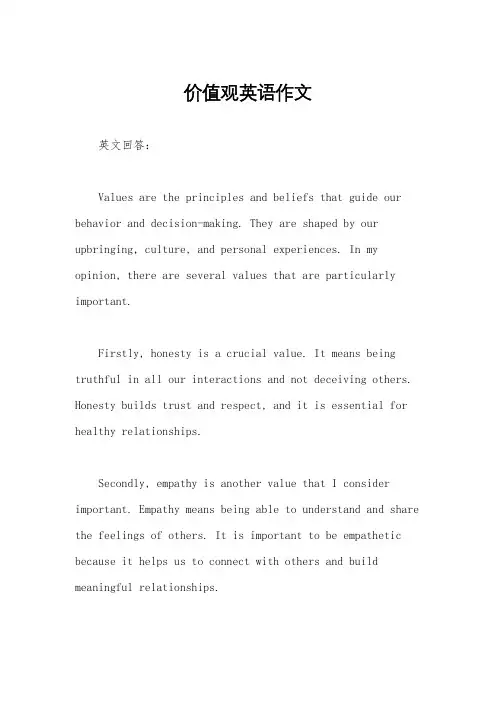
价值观英语作文英文回答:Values are the principles and beliefs that guide our behavior and decision-making. They are shaped by our upbringing, culture, and personal experiences. In my opinion, there are several values that are particularly important.Firstly, honesty is a crucial value. It means being truthful in all our interactions and not deceiving others. Honesty builds trust and respect, and it is essential for healthy relationships.Secondly, empathy is another value that I consider important. Empathy means being able to understand and share the feelings of others. It is important to be empathetic because it helps us to connect with others and build meaningful relationships.Thirdly, integrity is a value that I believe is essential. It means being true to our word and following through on our commitments. Integrity builds trust and credibility, and it is vital for personal and professional success.Finally, respect is a value that I consider important. It means treating others with dignity and valuing their opinions and beliefs. Respect fosters positive relationships and creates a harmonious society.In summary, honesty, empathy, integrity, and respect are values that I believe are important for a fulfilling and meaningful life.中文回答:价值观是指引我们行为和决策的原则和信念。
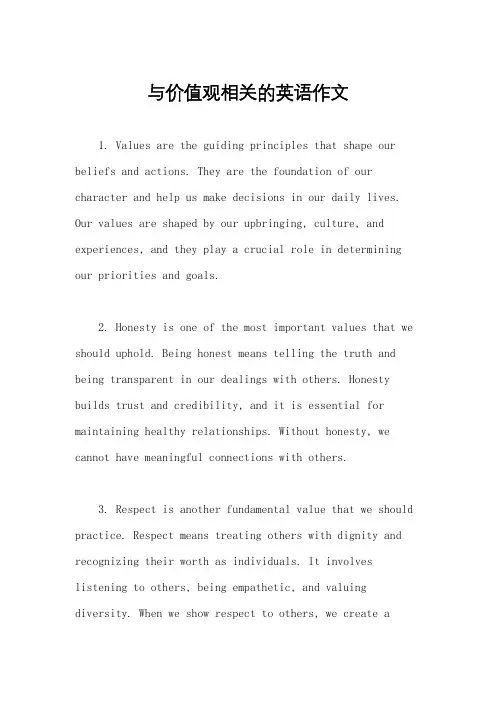
关于奋斗弘扬时代主旋律的例子奋斗是一种精神境界,是时代主旋律的重要组成部分。
在中国社会主义建设的过程中,奋斗精神激励着一代又一代人不断追求进步与发展。
以下是关于奋斗弘扬时代主旋律的十个例子:1. 习近平总书记提出的中国梦,鼓舞着亿万中国人民奋发图强,为实现民族复兴而努力奋斗。
无论是科技创新、经济发展还是社会进步,中国人民都在团结一心、顽强拼搏,为实现中国梦做出了巨大贡献。
2. 在中国改革开放的历程中,无数的企业家和创新者以奋斗精神为动力,积极投身到各行各业中。
他们不畏困难,追求创新,以自己的智慧和勤劳,不断推动中国经济的发展与进步。
3. 在教育领域,许多优秀的教师以奋斗为座右铭,用自己的教育智慧和爱心,培养出一代又一代的人才。
他们默默耕耘,无私奉献,为祖国的教育事业做出了巨大贡献。
4. 在医疗领域,无数的医生和护士以奋斗的精神,为病患提供了无私的关怀和救治。
特别是在疫情期间,他们冲锋在前,舍小家,顾大家,用自己的专业知识和勇气,保护着人民的生命安全。
5. 在文化艺术领域,许多艺术家以奋斗为信念,用自己的才华和创造力,创作出了许多优秀的作品。
他们通过艺术形式,传递正能量,弘扬时代主旋律,为人民群众提供了精神食粮。
6. 在农业领域,农民是祖国的脊梁。
他们以奋斗的精神,艰苦劳作,为国家粮食安全做出了巨大贡献。
无论是在艰苦的田野里,还是在科技农业的推动下,农民始终保持着奋斗的姿态,为祖国的农业现代化贡献自己的力量。
7. 在环保领域,越来越多的人以奋斗为动力,投身到环境保护事业中。
他们关注自然环境的恶化,积极参与到垃圾分类、节能减排等环保行动中,为建设美丽中国贡献自己的力量。
8. 在科技创新领域,许多科学家和工程师以奋斗为信念,不断攻关突破,取得了一系列重大科研成果。
无论是航天、信息技术还是生物医药,他们都以奋斗的精神,推动着中国科技的发展与进步。
9. 在社会公益领域,越来越多的志愿者以奋斗为动力,无私奉献,关爱弱势群体。

最重要的五个中国价值观英语作文The Five Most Important Chinese ValuesHi there! My name is Xiaoming and I'm a 10-year-old student in 5th grade. Today, I want to share with you the five most important values that we learn about in China. These values are really important in Chinese culture and help guide how we think and behave.The first big value is filial piety (孝xiào). This means respecting and taking good care of your parents and elderly family members. In China, we are taught from a very young age to obey our parents, honor our ancestors, and look after our elderly relatives. We believe that if we are good to our parents, they will be happy and we will have good fortune.My grandparents live with us, and every evening I make sure to make them a nice cup of hot tea. I also help my grandpa take his medicine. On the weekends, I run little errands for my grandma like going to the store to buy vegetables for her. Showing filial piety to our elders is one of the most important values in Chinese culture.The second core value is hard work and perseverance (勤劳qínláo). We are taught that through hard work, discipline andnever giving up, we can achieve great things. My parents always tell me "There is no free lunch in this world. If you want to succeed, you must work hard."In school, I spend many hours every night diligently studying and doing my homework. I never miss a day of class unless I am very sick. On weekends, I attend extra math and English classes. My parents believe that putting in great effort is the only way I can go to a top university and get a good job later on. Hard work is really emphasized in Chinese culture.Third is humility (谦逊qiānxùn). We are taught that we should not brag or boast about our accomplishments. It is important to remain humble and modest. If someone compliments me, I should not agree with them directly. Instead, I am supposed to downplay it, maybe by saying "It was nothing" or "I still have more to learn."My parents always tell me not to show off or talk about how good I am at something in front of others. They encourage me to listen more than I speak. Showing too much pride is considered very rude and arrogant in Chinese culture. We should not think too highly of ourselves.The fourth key value is unity and social harmony (团结tuánjié). We believe it is important for society to stick together,cooperate well, and avoid causing conflicts or disruptions. My teachers emphasize how we students must be a cohesive, unified class that helps and supports each other.If there are disagreements between students, the teacher will lecture us on why it is so vital to resolve the conflict and restore harmony to the class. Social unrest and individualism that fractures society is viewed very negatively. Instead, we are supposed to sacrifice our own interests for the greater good of maintaining a stable, unified community.The final core value is moral integrity and righteousness (正直zhèngzhí). We are taught it is crucial to be an upright, ethical person with sound moral character. Having integrity means being honest, doing the right thing, and always taking the moral high ground.For example, if I accidentally took a pencil from school that did not belong to me, I am expected to find the owner and return it. Or if there was a difficult situation where I could be dishonest for my own benefit, I should absolutely choose to be truthful instead. Following moral principles like being trustworthy, loyal, and righteous is considered supremely important.Well, those are the five biggest values in traditional Chinese culture - filial piety, hard work, humility, unity/social harmony,and moral integrity. They have been passed down through thousands of years of Chinese history. By upholding these key values, I can become a better, more principled person who shows respect to my family and contributes to the greater good of society. I hope you found this overview interesting!。
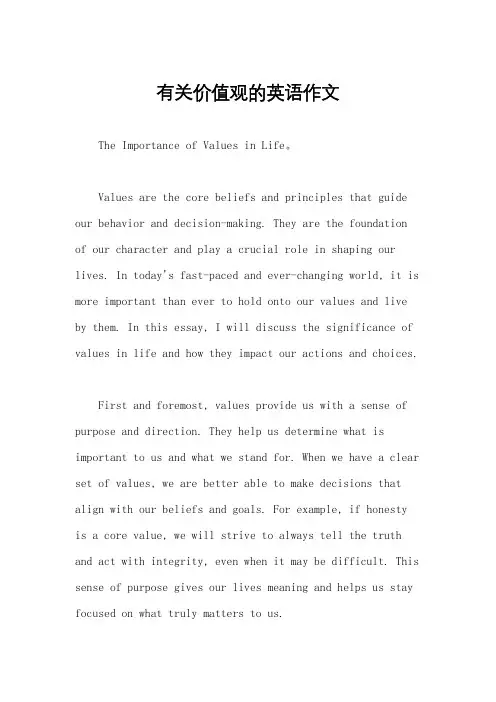
有关价值观的英语作文The Importance of Values in Life。
Values are the core beliefs and principles that guide our behavior and decision-making. They are the foundation of our character and play a crucial role in shaping our lives. In today's fast-paced and ever-changing world, it is more important than ever to hold onto our values and live by them. In this essay, I will discuss the significance of values in life and how they impact our actions and choices.First and foremost, values provide us with a sense of purpose and direction. They help us determine what is important to us and what we stand for. When we have a clear set of values, we are better able to make decisions that align with our beliefs and goals. For example, if honestyis a core value, we will strive to always tell the truth and act with integrity, even when it may be difficult. This sense of purpose gives our lives meaning and helps us stay focused on what truly matters to us.Furthermore, values serve as a moral compass, guidingus through the complexities of life. In times ofuncertainty or adversity, our values provide us with a framework for making ethical decisions. They help us distinguish between right and wrong, and give us thestrength to stand up for what we believe in. For instance,if compassion is a core value, we will be more inclined to help those in need and show empathy towards others, even when it may not be the most convenient choice. This moral guidance not only benefits us as individuals, but also contributes to the greater good of society.In addition, values shape our relationships and interactions with others. When we share common values with those around us, it creates a sense of unity and understanding. Our values influence the way we communicate, collaborate, and resolve conflicts with others. For example, if respect is a core value, we will treat others withdignity and consideration, fostering positive and harmonious relationships. This mutual respect and understanding strengthens the bonds we have with our family,friends, and colleagues, creating a supportive andinclusive environment.Moreover, living by our values promotes self-awareness and personal growth. When we consistently act in accordance with our values, we develop a strong sense of identity and integrity. This self-awareness allows us to live authentically and with conviction, leading to a greater sense of fulfillment and satisfaction. Additionally, our values challenge us to continuously strive for improvement and become the best version of ourselves. For example, if perseverance is a core value, we will persist in the face of challenges and setbacks, ultimately leading to personal growth and achievement.In conclusion, values are an essential part of our lives, shaping our beliefs, actions, and relationships. They provide us with a sense of purpose, moral guidance, and self-awareness, ultimately influencing the way we live and interact with the world around us. By embracing and living by our values, we can lead more meaningful and fulfilling lives, while also contributing to a morecompassionate and harmonious society. Therefore, it is important to reflect on our values and strive to uphold them in all aspects of our lives.。
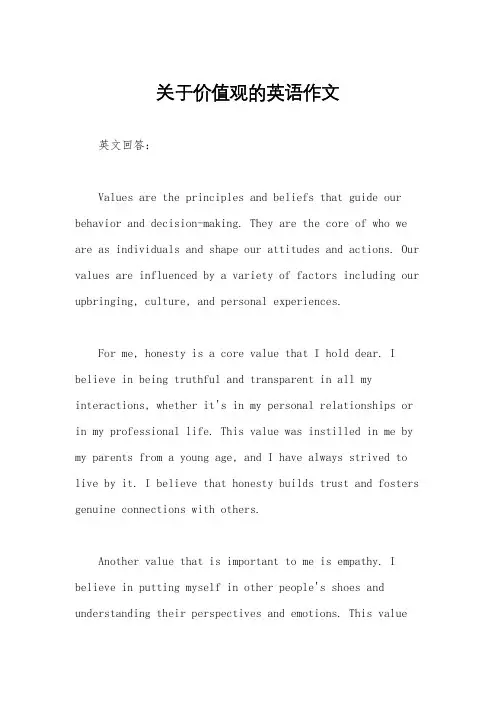
关于价值观的英语作文英文回答:Values are the principles and beliefs that guide our behavior and decision-making. They are the core of who we are as individuals and shape our attitudes and actions. Our values are influenced by a variety of factors including our upbringing, culture, and personal experiences.For me, honesty is a core value that I hold dear. I believe in being truthful and transparent in all my interactions, whether it's in my personal relationships or in my professional life. This value was instilled in me by my parents from a young age, and I have always strived to live by it. I believe that honesty builds trust and fosters genuine connections with others.Another value that is important to me is empathy. I believe in putting myself in other people's shoes and understanding their perspectives and emotions. This valuehas helped me build strong and meaningful relationships with others, as it allows me to connect with them on a deeper level. Empathy also plays a crucial role in my work, as it helps me understand the needs and concerns of the people I interact with.In addition to honesty and empathy, I also place a high value on perseverance. I believe in working hard and staying committed to my goals, even in the face of challenges and obstacles. This value has helped me overcome difficult situations and achieve success in both my personal and professional life.Overall, our values shape the way we live our lives and interact with the world around us. They serve as our moral compass and guide us in making decisions that align with our beliefs and principles.中文回答:价值观是指导我们行为和决策的原则和信念。
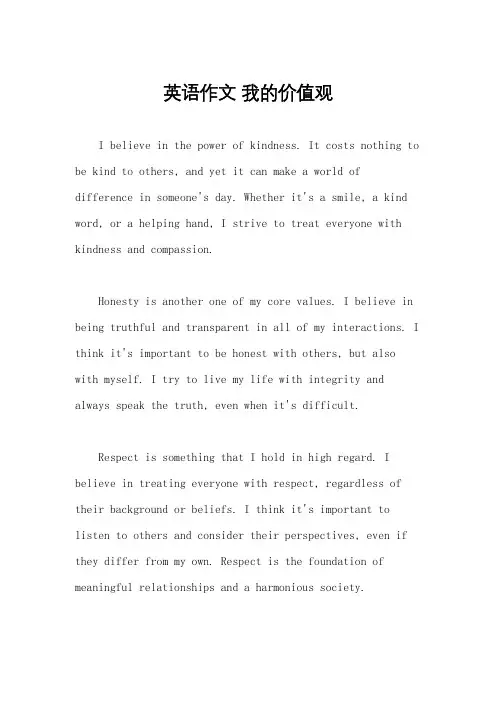
英语作文我的价值观I believe in the power of kindness. It costs nothing to be kind to others, and yet it can make a world ofdifference in someone's day. Whether it's a smile, a kind word, or a helping hand, I strive to treat everyone with kindness and compassion.Honesty is another one of my core values. I believe in being truthful and transparent in all of my interactions. I think it's important to be honest with others, but also with myself. I try to live my life with integrity and always speak the truth, even when it's difficult.Respect is something that I hold in high regard. I believe in treating everyone with respect, regardless of their background or beliefs. I think it's important to listen to others and consider their perspectives, even if they differ from my own. Respect is the foundation of meaningful relationships and a harmonious society.I value hard work and perseverance. I believe that anything worth achieving takes effort and dedication. I am not afraid of challenges, and I am willing to put in the work to achieve my goals. I believe that hard work pays off and that perseverance is the key to success.Finally, I believe in the importance of gratitude. Itry to appreciate the little things in life and express gratitude for the people and experiences that bring joyinto my life. I believe that gratitude can bring positivity and fulfillment, and I strive to cultivate a grateful mindset in everything I do.。
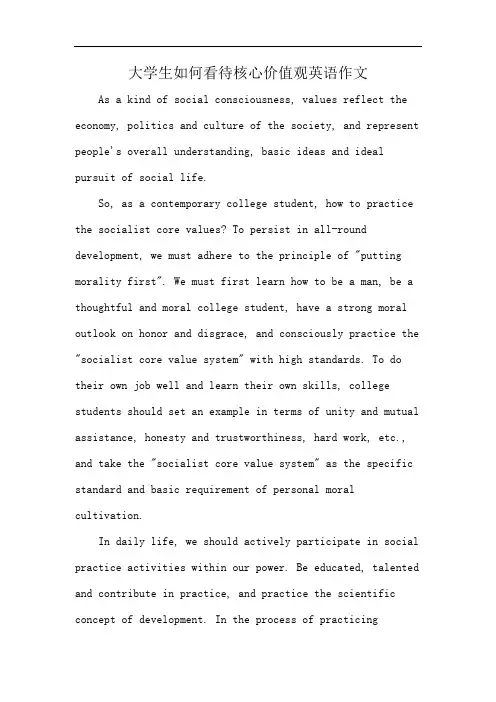
大学生如何看待核心价值观英语作文As a kind of social consciousness, values reflect the economy, politics and culture of the society, and represent people's overall understanding, basic ideas and ideal pursuit of social life.So, as a contemporary college student, how to practice the socialist core values? To persist in all-round development, we must adhere to the principle of "putting morality first". We must first learn how to be a man, be a thoughtful and moral college student, have a strong moral outlook on honor and disgrace, and consciously practice the "socialist core value system" with high standards. To do their own job well and learn their own skills, college students should set an example in terms of unity and mutual assistance, honesty and trustworthiness, hard work, etc., and take the "socialist core value system" as the specific standard and basic requirement of personal moral cultivation.In daily life, we should actively participate in social practice activities within our power. Be educated, talented and contribute in practice, and practice the scientific concept of development. In the process of practicingsocialist core values, college students should be self-disciplined, ashamed and reformed. Only in this way, under the premise of building a harmonious society, can we take the opportunity of practicing the "socialist core value system" and give full play to the talent quality advantages of college students to build a harmonious campus and a harmonious society.。
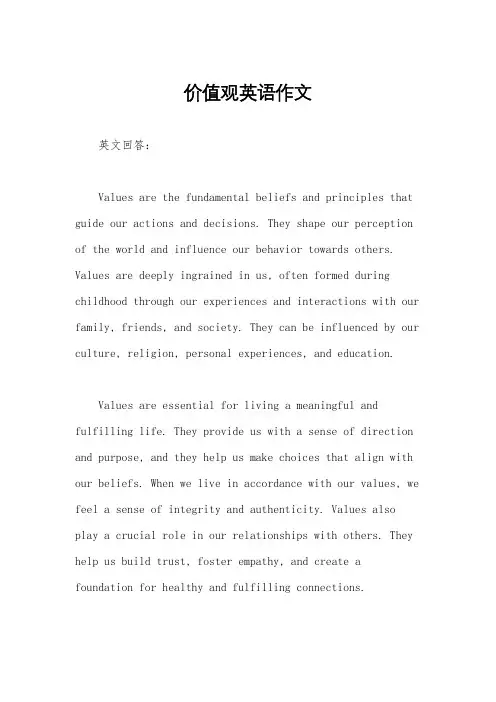
价值观英语作文英文回答:Values are the fundamental beliefs and principles that guide our actions and decisions. They shape our perception of the world and influence our behavior towards others. Values are deeply ingrained in us, often formed during childhood through our experiences and interactions with our family, friends, and society. They can be influenced by our culture, religion, personal experiences, and education.Values are essential for living a meaningful and fulfilling life. They provide us with a sense of direction and purpose, and they help us make choices that align with our beliefs. When we live in accordance with our values, we feel a sense of integrity and authenticity. Values also play a crucial role in our relationships with others. They help us build trust, foster empathy, and create a foundation for healthy and fulfilling connections.Identifying our values is a journey of self-discovery.It involves reflecting on our past experiences, examining our beliefs, and considering our aspirations for the future. By understanding our values, we can make conscious choices that are in alignment with who we are and what we want to achieve. Values are not static; they can evolve and change over time as we grow and learn. It is important to periodically revisit our values and consider whether they still resonate with us.Some common values that people hold include:Honesty。
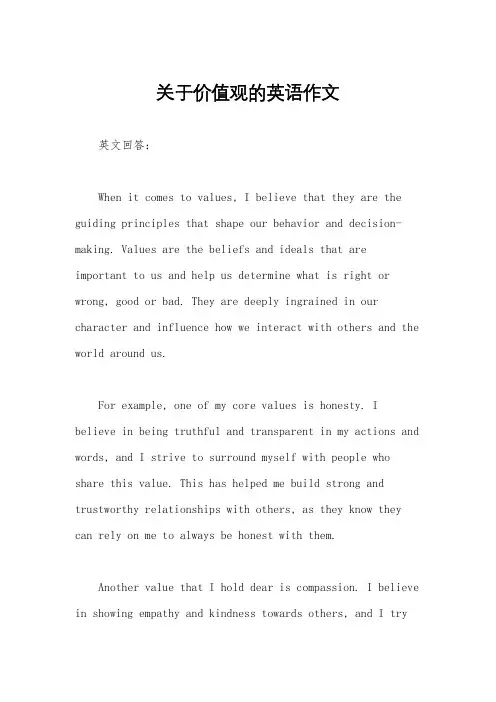
关于价值观的英语作文英文回答:When it comes to values, I believe that they are the guiding principles that shape our behavior and decision-making. Values are the beliefs and ideals that are important to us and help us determine what is right or wrong, good or bad. They are deeply ingrained in our character and influence how we interact with others and the world around us.For example, one of my core values is honesty. I believe in being truthful and transparent in my actions and words, and I strive to surround myself with people who share this value. This has helped me build strong and trustworthy relationships with others, as they know they can rely on me to always be honest with them.Another value that I hold dear is compassion. I believe in showing empathy and kindness towards others, and I tryto make a positive impact in the lives of those around me. Whether it's lending a listening ear to a friend in need or volunteering at a local charity, I believe that showing compassion towards others is essential for creating a more caring and understanding society.In addition to honesty and compassion, I also value perseverance. I believe in working hard and persisting through challenges in order to achieve my goals. This value has helped me overcome obstacles and achieve success in both my personal and professional life.Overall, I believe that our values shape who we are as individuals and guide us in making decisions that align with our beliefs and principles. They serve as a moral compass, helping us navigate through life's challenges and uncertainties.中文回答:谈到价值观,我认为它们是塑造我们行为和决策的指导原则。
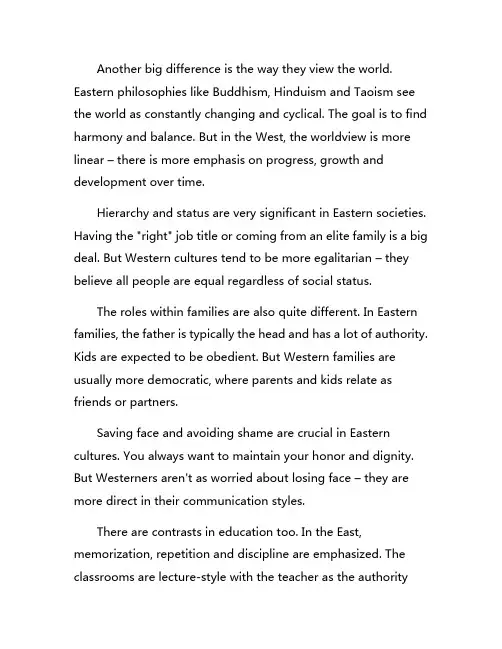
关于东方和西方价值观的差异的英语作文全文共6篇示例,供读者参考篇1The Differences Between East and WestHave you ever noticed how different things can be in other parts of the world? I've been learning about the big differences between Eastern and Western cultures and values, and it's really fascinating! Let me tell you what I've discovered.In the East, which includes countries like China, Japan, Korea and India, one of the most important values is collectivism. This means that the group or society is valued over the individual. Family and community ties are super strong. Kids are taught from a young age to respect elders, obey parents and teachers, and put the needs of the group first.In contrast, Western cultures like the United States, England, and France place a higher importance on individualism. People are encouraged to be independent, pursue their own goals, and express their unique personalities. Personal freedoms and human rights are really valued.Another big difference is the way they view the world. Eastern philosophies like Buddhism, Hinduism and Taoism see the world as constantly changing and cyclical. The goal is to find harmony and balance. But in the West, the worldview is more linear – there is more emphasis on progress, growth and development over time.Hierarchy and status are very significant in Eastern societies. Having the "right" job title or coming from an elite family is a big deal. But Western cultures tend to be more egalitarian – they believe all people are equal regardless of social status.The roles within families are also quite different. In Eastern families, the father is typically the head and has a lot of authority. Kids are expected to be obedient. But Western families are usually more democratic, where parents and kids relate as friends or partners.Saving face and avoiding shame are crucial in Eastern cultures. You always want to maintain your honor and dignity. But Westerners aren't as worried about losing face – they are more direct in their communication styles.There are contrasts in education too. In the East, memorization, repetition and discipline are emphasized. The classrooms are lecture-style with the teacher as the authorityfigure. Western education focuses more on creative thinking, discussions and student participation.The religious philosophies are poles apart as well. The main Eastern religions like Buddhism, Hinduism, Taoism and Confucianism have very different beliefs and practices compared to the main Western religions of Christianity, Judaism and Islam.So which approach is better – the Eastern collectivist mindset or the Western individualism? I can see pros and cons to both! The sense of duty, order and community in the East is admirable. But the Western freedoms and personal expression are awesome too. I guess the ideal is to find some kind of harmonious balance between the two perspectives.It's been really interesting learning about these contrasting worldviews and value systems. As the world becomes increasingly globalized, I think it's more important than ever to understand and appreciate our cultural differences. With open minds on both sides, we can learn a lot from each other!篇2Certainly! Here is an essay of around 2000 words, written in English from the perspective of an elementary school student, exploring the differences between Eastern and Western values:East and West: Seeing the World Through Different EyesHi there! My name is Emma, and I'm 10 years old. Today, I want to talk to you about something really interesting that I've been learning about in school – the differences between Eastern and Western cultures and values.You see, our world is a big, diverse place, filled with all sorts of people who have different ways of thinking, living, and looking at life. It's kind of like a giant puzzle, with each culture representing a unique篇3The Differences Between Eastern and Western ValuesHi there! Today I want to talk to you about the interesting differences between the values of Eastern and Western cultures. Values are the beliefs and ideas that people consider important in life. Even though we're all human beings, people from different parts of the world can have pretty different values based on their cultures and traditions.Let's start by talking about some key Western values. Many Western cultures, like in Europe and North America, really value individuality. This means they believe it's important for eachperson to be independent, make their own choices, and follow their own path in life. Western cultures also tend to value things like freedom of speech, democracy, and human rights.Another big Western value is the pursuit of happiness. People in the West often believe that the main goal in life should be finding happiness, whether that's through their job, hobbies, relationships, or achieving personal goals. They usually feel that people have the right to make their own choices to be happy, even if others might not agree with those choices.Now let's switch over to some key values in Eastern cultures, like in Asia. One very important Eastern value is collectivism. This means there is a strong focus on the group or community, rather than just the individual. Family ties, loyalty, and fitting in with society are seen as much more crucial than individual wants and needs.Respect for elders and ancestors is another big Eastern value that relates to collectivism. In many Eastern cultures, older people are considered very wise and are highly respected. Children are taught to obey and honor their parents and grandparents. Families even make offerings or pray to their ancestors who came before them.Another core Eastern value is the concept of harmony. This means trying to live in peace and balance with others and with nature. There is an emphasis on avoiding conflict and maintaining stable relationships and social order. Individuals are expected to know their place and role within society's hierarchy.Those are some of the key differences, but of course there can be a lot of variety too. Some people in the West might care a lot about community, while some people in the East might really value individual freedom. And many cultures all around the world share some similar values too, like hard work, kindness, and respect for education.It's fascinating to learn about how values can be so different across cultures, isn't it? I think it's important to keep an open mind, and to appreciate that there is wisdom and beauty in all cultures and philosophies, even if the values seem very different from our own. The world would be an awfully boring place if we all believed in exactly the same things!What do you think about these different cultural values? Which values feel most important to you and your family? I'd love to hear your thoughts! Learning about diversity and different perspectives can help us all become kinder, smarter, and more understanding people.篇4The Big Differences Between East and WestDo you know that people in different parts of the world can have really different ideas about what's important in life? The values that guide how people think and act can be quite different depending on whether they grow up in Eastern or Western cultures. Let me tell you about some of the biggest differences I've learned!In the East, values like harmony, hierarchy, and confidence in authorities are super important. But in the West, individuality, equality, and questioning authorities are more emphasized. Crazy, right?Take harmony for example. In many Eastern societies like China, Japan, and Korea, keeping harmony and avoiding conflict is seen as really valuable. You're supposed to go with the flow, not rock the boat too much. But in a lot of Western cultures, it's more acceptable to speak your mind openly and directly, even if it might cause some disagreement or tension. The ideal is to express your individual views.Hierarchy is another big difference. In the East, hierarchies and chain of command are deeply respected. Younger peopleare expected to show a lot of deference to elders and those in authority positions. The idea is that this hierarchy helps keep social order. But in the West, while there is still hierarchy, the ideal is more about equality among people. Everybody's voice and opinions are valued more equally regardless of status or position.Then there's the whole issue of authorities and questioning them. In Eastern thinking, authorities like leaders, teachers, experts are to be listened to very carefully. Their wisdom is deeply trusted. But in the West, questioning authorities and being skeptical of their claims is more encouraged. You're supposed to think for yourself and not just blindly accept what you're told.Those are some of the really big differences when it comes to values between East and West. There are exceptions of course, and things are changing over time. But in general, Eastern cultures tend to emphasize harmony, hierarchy, and confidence in authorities. Western cultures put more emphasis on individuality, equality, and questioning authorities.Why do you think these differences exist? Well, geography and history play a big role. Cultures that developed in regions with a lot of people living in crowded spaces, like in Asia, tendedto evolve values that helped maintain social order and cohesion when tons of people are living closely together. Whereas cultures in more wide open spaces, like North America and Europe, could afford to be more individualistic.Philosophies and religions also really shaped values. Ancient philosophies like Confucianism in China stressed hierarchy, respect for elders and authorities, and social harmony above all. On the other hand, Western philosophies stemming from ancient Greece put more focus on individual rights, equality under the law, and using reason and logic to question ideas.Nowadays with globalization, these differences in values are really colliding and influencing each other. I think learning about the differences, and commonalities too, is super interesting and important for getting along in our interconnected world. As you grow up, I hope you'll keep an open mind to different perspectives and find your own balanced view!So those are some of the major differences I've observed between Eastern and Western values and worldviews. Of course, this is just scratching the surface - entire books could be written on the topic! Let me know if you have any other questions. Thanks for reading!篇5The Big Differences Between Eastern and Western ValuesHi there! Today I want to talk about some of the big differences between how people in the East and people in the West view the world. The East means countries and cultures like China, Japan, Korea and India. The West means places like the United States, England, France and Germany. Even though we're all human beings, our values and ways of thinking can be quite different sometimes!One major difference is how we see the individual versus the group. In the West, we really value the individual. We believe each person should be free to pursue their own dreams and goals. We celebrate individualism and being unique. But in the East, there is more of a focus on fitting in with the group. The group's needs often come before the individual's wants. Respecting hierarchy and tradition篇6Differences Between Eastern and Western ValuesHi there! My name is Emily and I'm 10 years old. Today I want to talk to you about something I've been learning about inschool - the differences between Eastern and Western values. It's a big topic, but I'll do my best to explain it in a way that makes sense.First, let me start by explaining what values are. Values are the things that are really important to us, the beliefs and principles that guide how we live our lives and treat others. Every culture and society has its own set of values that are passed down from generation to generation.In the West, which includes places like the United States, Canada, and Europe, some of the core values are individualism, freedom, democracy, and equality. Individualism means that people value being independent and making their own choices. Freedom is really important too - the freedom to speak your mind, practice your religion, and live how you want to live. Democracy is when the people get to vote for their leaders and have a say in how their country is run. And equality means treating everyone fairly, no matter their race, religion, gender or beliefs.Over in the East, which includes countries like China, Japan, and India, some of the main values are harmony, hierarchy, group loyalty, and spiritual peace. Harmony is all about living in balance and avoiding conflict. Having a strong hierarchy, wherepeople respect authority and their elders, is also really valued. Group loyalty means putting your family and community before yourself. And spiritual peace through meditation, contemplation and being one with nature is seen as very important.Those are some of the big picture differences, but let me give you a few more specific examples to help make it clearer:In Western cultures, it's really encouraged to be unique, to stand out from the crowd and express your individuality. But in Eastern cultures, fitting in with the group and not drawing too much attention to yourself is often seen as more desirable behavior.Western parents usually teach their kids to be independent, make their own decisions, and develop their own beliefs and opinions. But in many Eastern families, children are expected to obey their parents and elders without question.In the West, people really value efficiency, punctuality and getting things done quickly. But in the East, there's more of an emphasis on being patient, going with the flow, and not rushing things.Western societies tend to favor direct communication, where you say exactly what you mean. Eastern cultures often prefermore indirect communication to avoid confrontation and preserve social harmony.Those are just a few of the key differences I've learned about! Of course, there are lots of exceptions and every individual is unique. And the world is becoming more connected than ever, so Eastern and Western values are blending together in many places.Even though Eastern and Western values can seem really different on the surface, I've learned that at their core, most cultures want similar things – health, happiness and peace for their families and communities.。
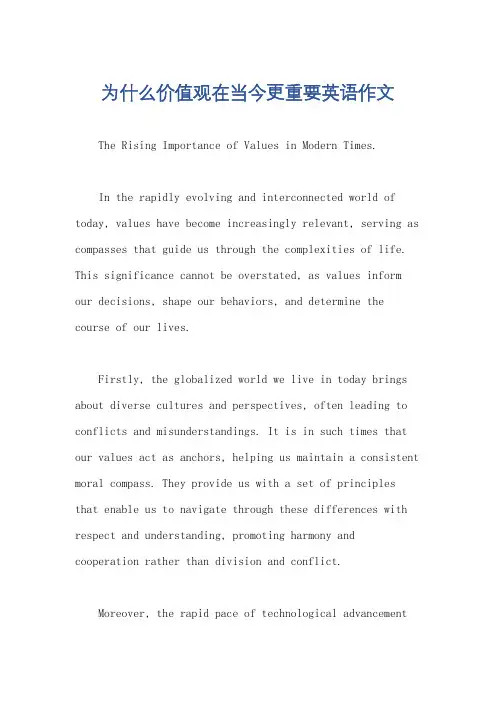
为什么价值观在当今更重要英语作文 The Rising Importance of Values in Modern Times. In the rapidly evolving and interconnected world of today, values have become increasingly relevant, serving as compasses that guide us through the complexities of life. This significance cannot be overstated, as values inform our decisions, shape our behaviors, and determine the course of our lives.
Firstly, the globalized world we live in today brings about diverse cultures and perspectives, often leading to conflicts and misunderstandings. It is in such times that our values act as anchors, helping us maintain a consistent moral compass. They provide us with a set of principles that enable us to navigate through these differences with respect and understanding, promoting harmony and cooperation rather than division and conflict.
价值观英语作文Values Essay。
In the tapestry of human existence, values serve as threads that weave together the intricate fabric of our lives. They are the guiding principles that shape our decisions, define our purpose, and provide meaning to our experiences. As individuals, we each hold a unique set of values that reflect our beliefs, aspirations, and priorities.Values play a crucial role in both our personal and societal development. They provide a framework for making ethical judgments, fostering empathy, and promoting harmonious relationships. By aligning our actions with our values, we cultivate a sense of authenticity, integrity, and self-respect.In a world fraught with challenges and conflicting ideologies, it is imperative to have a solid foundation ofvalues to navigate through life's complexities. Values serve as beacons of guidance, helping us to make informed decisions, even in the face of adversity. They empower us to stand firm in our convictions and to act in accordance with our principles, regardless of external pressures.The process of identifying and cultivating our valuesis an ongoing journey of self-discovery. Through introspection, reflection, and engagement with others, we gain a deeper understanding of what truly matters to us. It is often through experiences and challenges that our values are tested and refined.As we navigate through life, it is inevitable that our values may evolve and change. This is not a sign of weakness or inconsistency, but rather a testament to our growth and adaptability. As we gain new knowledge, perspectives, and experiences, our values may shift and adjust to reflect our evolving understanding of the world around us.In conclusion, values are essential for living ameaningful and fulfilling life. They provide us with direction, purpose, and a framework for making ethical decisions. By embracing and cultivating our values, we not only shape our own lives but also contribute to the well-being of our communities and the broader human experience.中文回答:价值观。
谈谈自己的价值观英语作文My Values。
Values are the principles that guide our lives and define our character. They are the beliefs and ideals that we hold dear and that shape our decisions and actions. For me, my values are the foundation of who I am and what I stand for. In this essay, I will discuss my values and how they influence my life.First and foremost, honesty is one of my most important values. I believe that honesty is the key to building trust and maintaining strong relationships. I always strive to be truthful and transparent in my dealings with others, whether it is in my personal or professional life. I believe that honesty is not just about telling the truth, but also about being accountable for my actions and taking responsibility for my mistakes.Another value that I hold dear is respect. I believethat everyone deserves to be treated with dignity and respect, regardless of their background or status. I try to be mindful of this in my interactions with others, and I always try to listen to their perspectives and opinions. I believe that respecting others is essential to building strong and lasting relationships, and it is an integral part of being a good citizen.Integrity is also a value that I hold in high esteem. I believe that integrity is about doing the right thing, even when no one is watching. It is about being true to oneself and one's values, and it is about standing up for what is right, even in the face of adversity. I try to live my life with integrity, and I believe that it is essential to earning the trust and respect of others.Compassion is another value that is important to me. I believe that we all have a responsibility to help others and to make the world a better place. I try to be empathetic and understanding of others' struggles and challenges, and I always try to lend a helping hand whenever I can. I believe that compassion is an essentialpart of being a good human being, and it is something that we should all strive to cultivate in ourselves.Finally, I value hard work and perseverance. I believe that success comes from hard work and dedication, and I always try to give my best effort in everything that I do.I believe that perseverance is essential to achieving one's goals, and I try to stay focused and motivated even when faced with obstacles or setbacks.In conclusion, my values are an integral part of who I am and what I stand for. They guide my decisions and actions, and they help me to be the best version of myself.I believe that honesty, respect, integrity, compassion, and hard work are essential values that we should all strive to cultivate in ourselves, and I will continue to live my life in accordance with these principles.。
社会主义核心价值观中关于敬业的英语作文English:Dedication is one of the core values emphasized in Socialist Core Values. This value highlights the importance of being committed and diligent in one's work or occupation. The principle of dedication encourages individuals to fulfill their responsibilities, strive for excellence, and contribute to the overall welfare of society. It promotes the idea that success is achieved through hard work, perseverance, and a strong work ethic. By emphasizing dedication, Socialist Core Values aim to cultivate a sense of responsibility, discipline, and work ethic among individuals, which are crucial for the development and progress of society as a whole.Translated content:敬业是社会主义核心价值观中强调的核心价值之一。
这一价值强调了在工作或职业中保持承诺和勤奋的重要性。
敬业的原则鼓励个人履行责任,追求卓越,为社会的整体福祉做出贡献。
它倡导成功是通过勤奋、毅力和良好的职业道德取得的。
通过强调敬业精神,社会主义核心价值观旨在培养个人的责任感、纪律性和职业道德,这对整个社会的发展和进步至关重要。
最重要的五个中国价值观英语作文全文共3篇示例,供读者参考篇1The Five Most Important Chinese ValuesChinese culture has a long and rich history, with values deeply rooted in tradition and philosophy. Here are the five most important Chinese values that have guided the Chinese people for centuries:1. Filial Piety (孝顺)Filial piety, or respect for one's parents and ancestors, is considered one of the most important virtues in Chinese culture. It is believed that caring for one's parents and elders is a moral duty and a way to honor one's ancestors. Filial piety is reflected in Chinese customs such as respecting elders, taking care of aging parents, and performing rituals to honor deceased ancestors.2. Harmony (和谐)Harmony is a central concept in Chinese philosophy and culture. It emphasizes the importance of balance, cooperation,and peaceful coexistence. In Chinese society, harmony is valued in interpersonal relationships, family dynamics, and community interactions. It is believed that maintaining harmony leads to prosperity and stability for individuals and society as a whole.3. Respect for Tradition (尊重传统)Chinese culture places a strong emphasis on respecting tradition and preserving cultural heritage. Traditional values, customs, and beliefs are passed down from generation to generation, shaping the identity and values of the Chinese people. By honoring tradition, Chinese people maintain a connection to their history and cultural roots.4. Work Ethic (勤劳)The Chinese value of hard work and diligence is deeply ingrained in Chinese society. It is believed that success comes from effort, perseverance, and dedication to one's work. Chinese people are known for their strong work ethic and commitment to achieving their goals through hard work and discipline. This value has contributed to China's economic growth and development over the years.5. Unity (团结)Unity is a fundamental value in Chinese culture, emphasizing the importance of solidarity, cooperation, and teamwork. Chinese people value collective harmony and cooperation in achieving common goals. Unity is reflected in Chinese traditions such as family loyalty, community support, and national pride. By working together and supporting each other, Chinese society can achieve greater success and prosperity.In conclusion, these five values - filial piety, harmony, respect for tradition, work ethic, and unity - are the cornerstone of Chinese culture and identity. They guide the behavior and beliefs of the Chinese people, shaping their interactions with others and their outlook on life. By upholding these values, Chinese society continues to thrive and uphold its rich cultural heritage.篇2The Five Most Important Chinese ValuesChina is a country with a rich and diverse history, and its culture is characterized by a set of core values that have guided its people for centuries. These values are deeply ingrained in the Chinese way of life and have shaped the country's social norms, political institutions, and cultural practices.In this essay, we will discuss the five most important Chinese values that continue to hold significance in modern Chinese society.1. FamilyFamily is considered the most important social unit in China. Chinese people place a high value on family relationships and prioritize the well-being of their family members above all else. Filial piety, or respect for one's elders, is a key aspect of Chinese family values. Children are expected to care for their parents in their old age and honor their ancestors through traditional rituals and ceremonies.2. HarmonyThe concept of harmony, or "he", is deeply rooted in Chinese philosophy and culture. Harmony refers to the balance and unity of opposites, and it is considered essential for maintaining peace and stability in society. Chinese people strive to live in harmony with nature, with others, and with themselves. This value is reflected in the emphasis on social cohesion, consensus-building, and conflict resolution through dialogue and compromise.3. EducationEducation is highly valued in Chinese society, as it is seen as the key to personal success and social mobility. Parents invest heavily in their children's education, and students work diligently to excel academically. The Chinese education system is rigorous and competitive, with a strong emphasis on discipline, hard work, and academic achievement. Confucian values of respect for teachers and a thirst for knowledge continue to influence Chinese attitudes towards education.4. Work ethicChinese people are known for their strong work ethic and dedication to their professions. Hard work, discipline, and perseverance are highly valued virtues in Chinese culture. The concept of "wei-ji", or "crisis and opportunity," underscores the importance of facing challenges with resilience and resourcefulness. Chinese workers are known for their commitment to their jobs, their willingness to work long hours, and their focus on achieving excellence in their careers.5. Respect for traditionChinese culture is steeped in tradition, and respect for tradition is a fundamental value in Chinese society. Traditional customs, rituals, and beliefs are passed down from generation to generation, shaping the cultural identity of the Chinese people.Chinese traditions such as Chinese New Year, the Dragon Boat Festival, and the Mid-Autumn Festival are celebrated with great enthusiasm and reverence. The preservation of traditional values and practices is seen as essential for maintaining cultural continuity and national identity.In conclusion, the five values discussed above - family, harmony, education, work ethic, and respect for tradition - are foundational principles that have shaped Chinese society for centuries. These values continue to play a key role in shaping the attitudes, behaviors, and values of the Chinese people today. By understanding and appreciating these core values, we can gain a deeper insight into the cultural richness and complexity of Chinese civilization.篇3The Five Most Important Chinese ValuesChina, with its rich history and cultural heritage, has developed a set of values that have been guiding its people for centuries. These values encompass principles such as respect for elders, harmony with nature, filial piety, loyalty, and righteousness. In this essay, we will delve into the significance of each of these values and how they have shaped Chinese society.1. Respect for eldersIn Chinese culture, respect for elders is held in high regard. This value stems from the belief that older individuals possess wisdom and experience that should be honored and revered. Filial piety, a key tenet in Confucianism, emphasizes the importance of caring for and respecting one's parents and ancestors. This value is evident in Chinese households, where children are taught to listen to and obey their elders, as well as take care of them in their old age.2. Harmony with natureAnother core value in Chinese culture is the idea of living in harmony with nature. This is rooted in Daoism, a philosophical tradition that emphasizes the interconnectedness of all things. Chinese people strive to maintain a balance between humans and the natural world, showing respect for the environment and its resources. This value can be seen in practices such as traditional Chinese medicine, which often incorporates natural remedies and techniques to promote health and well-being.3. Filial pietyFilial piety, as mentioned earlier, is a fundamental value in Chinese society. This concept revolves around the idea ofhonoring and caring for one's parents and ancestors. It is seen as a moral duty for children to respect and support their parents in their old age, as a way of showing gratitude for the sacrifices made on their behalf. Filial piety is considered not only a virtue but also a way to maintain family harmony and social order.4. LoyaltyLoyalty is another key value in Chinese culture, particularly in the context of relationships and social bonds. Whether in friendships, marriages, or business partnerships, loyalty is highly valued and expected. Loyalty is seen as a sign of integrity, trustworthiness, and commitment, and those who demonstrate loyalty are admired and respected by others. This value is deeply ingrained in Chinese society and has been upheld throughout history, as seen in the loyalty between rulers and subjects, friends, and family members.5. RighteousnessRighteousness, or moral integrity, is the fifth important Chinese value that we will discuss. This value emphasizes the importance of upholding moral principles, doing what is right, and acting with integrity in all aspects of life. Righteousness is seen as a way to maintain order and harmony in society, as well as to uphold the values of honesty, fairness, and justice. It is aguiding principle that helps individuals make ethical decisions and live a virtuous life.In conclusion, the five most important Chinese values—respect for elders, harmony with nature, filial piety, loyalty, and righteousness—serve as guiding principles for individuals and society as a whole. These values are deeply rooted in Chinese culture and have played a significant role in shaping the country's history, traditions, and moral foundation. By upholding these values, Chinese people continue to strive for personal and societal excellence, while fostering strong relationships, preserving the environment, and promoting ethical behavior.。
英语作文传统的价值观(Traditional moral values)
第一段:从儒家“修身、齐家、治国、平天下”的道理想到当今中国政府的官员腐败问题。
第二段:从官员的腐败问题谈到人们价值观的变化的体现。
第三段:依法治国和以德治国的意义所在。
第四段:总结。
net
There's so much for me to talk about in terms of traditions of family and community as a chinese. Confucius alone gave us much food for thought which is still being advocated but hardly practiced today. For example,
"self-cultivation, regulating the family, managing the nation, and establishing peace all over the world", a standard conduct of the Chinese society for thousands of years, is eclipsed by individual thirst to glean more fortune. How one's own fortune goes curtainly prevail over how a nation's does. In China the ammount of bribe money is astonishingly large and the number of corrupt officials which have been brought to the justice is not as large as those who are not yet. Why do these civil servants risk their fame and even lives in defiance of law? Greed and selfishness account for it.
Corrupton among public service is but a drop in the ocean when it comes to the demise of the morality. As I walked around the downtown the other day, I found people, with their fancy clothes and stylish hairdos ,appear too materialistic,which is not to my liking. Wasn't there a time when things were simpler and people were more humble?Once bogged down in private interest, one finds oneself blinded by the greed and selfishness.
Advocating the traditional moral values about family and community is definitely necessary. Actually it has adopted by the Chinese government as a key policy to run the coounty by combining the rule of law with the rule of virtue ,which is the essence of Confucianism.
I know modernization is necessary for advancement .However ,I hope we will forget the traditional moral values along the way.。